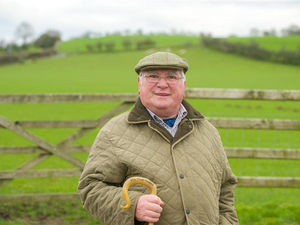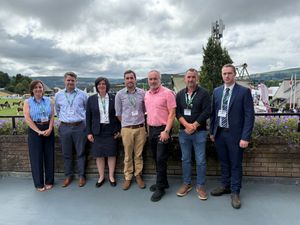Shropshire trials pave way for more areas to benefit from 5G technology
Trials in Shropshire have helped pave the way for more rural areas to benefit from 5G technology.
The Government today launched a competition for rural areas that would see them host tests of groundbreaking 5G applications, as part of plans to spark a wider roll-out of the communications technology.
The £30 million competition will see up to 10 rural locations chosen to run trials of 5G-related technology, which would involve superfast 5G test networks being set up there.
It comes after 5G was used in Shropshire for trials to help the farming industry with targeted crop-spraying and soil analysis with drones and tractors.
The county is home to a world-leading research facility on the use of technology in farming at Harper Adams University, near Newport. Experts there have developed new technology to improve the efficiency of farming, including highly-sophisticated drones and robot machinery that can be operated alone using GPS mapping systems.
The lessons learned in Shropshire will now be used to widen the benefits of 5G. Another trial area was the Orkney Islands, where 5G helped remotely monitor salmon fisheries and improve the efficiency of wind farms.
The Government said it hoped the scheme, called the Rural Connected Communities competition, could help stimulate investment in 5G and help countryside communities take advantage of the technology.
Digital Secretary Nicky Morgan said: “The British countryside has always been a hotbed of pioneering industries and we’re making sure our rural communities aren’t left behind in the digital age.
“We’re investing millions so the whole country can grasp the opportunities and economic benefits of next-generation 5G technology. In modern Britain, people expect to be connected wherever they are. And so we’re committed to securing widespread mobile coverage and must make sure we have the best infrastructure to stay ahead.”
The Government has also announced the launch of a consultation on proposals to simplify planning rules to improve rural mobile coverage.
It will seek views on proposals that would change the permitted height of new masts as well as allow existing ground-based masts to be strengthened without prior approval.
Housing and Planning minister Esther McVey said: “We’re committed to delivering the homes people across the country need, and that includes delivering the right infrastructure such as broadband connectivity and good mobile coverage.
“There is nothing more frustrating than moving into your new home to find signal is poor.
“That’s why we are proposing to simplify planning rules for installing the latest mobile technology - helping to extend coverage and banish more of those signal blackspots, particularly for those living in rural areas.”





